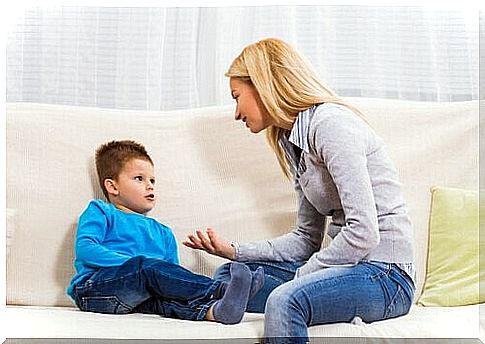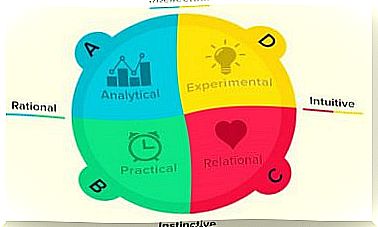Can We Turn Tantrums Into An Educational Opportunity?

Our children’s temper tantrums can be a sign that they are feeling frustrated or emotionally overwhelmed. Identifying when and why these crises are occurring will give us clues as to how we can help them manage them properly.
When the anger ends, learning opportunities arise in order to reflect, with the child, on what has just happened. This way we can invite them to think about other positive ways of reacting to what has happened. And teach them to communicate better as soon as they are aware of their emotions.
We are now going to walk you through several strategies to use before and after tantrums. This will allow you to turn these situations into learning opportunities and make them easier. Let’s dig deeper into this point .
How to act during a temper tantrum
Keep calm
Losing calm during a child’s temper tantrum can further complicate the situation. We raise the tone and as a result children may feel more stressed. We are probably also setting a very bad example by getting angry. The adult’s duty is to teach children other ways to deal with frustration and to express their feelings and desires.
It is therefore important to keep calm. And to concentrate his efforts on the child. By doing this, we will become a reference figure to which he can resort. In case of inability to control his emotions.

Don’t take the situation personally
Usually, when our kids have a tantrum, they don’t do it to get our attention. Or provoke us and get angry. They are usually overwhelmed with their emotions because of the situation they find themselves in. In fact, they don’t know how to act otherwise. They feel frustration or rage. And express it through this crisis.
We should not take their anger as a personal thing. It is a way of reacting to what has happened. And they can learn to manage it.
The way we deal with our emotions is probably related to the way our parents taught us to do so. You must therefore understand that you are an example for your children.
If our parents took our tantrums personally and didn’t teach us another way to deal with our emotions, it is likely that we experience a lot of negative emotions during our children’s temper tantrums. Moreover, we will surely not be able to manage them.
Showing empathy
It is fundamental to empathize with our children and their feelings. We must try to put the right words on what is happening to them. For that, we need to talk to them calmly and step up to them when we do. They will feel more listened to and understood.
Remember that tantrums are not a personal attack. Children do not know how to channel their negative feelings and therefore feel bad. Their only way of communicating is through screaming and crying. We must therefore try to translate them so that they also know how to do it in the future.
On the other hand, empathy does not mean having to give in to the tantrum. If we give in, we are not giving them tools to learn to deal with their emotions. Quite the contrary. We will give them resources to express themselves through temper tantrums when they want something.
Empathizing with children therefore means trying to translate what we think is happening to them. For example, “I think you got mad because you were playing and we had to leave” or “you wanted to put your shoes on by yourself but I had to help you and you felt frustrated ”. This way the child will feel that you are putting yourself in their shoes, will calm down and listen to you.
Providing her with an alternative and changing her focus to prevent it from happening over and over again can also be a good idea. However, this alternative works best when he is calm and feels understood. If we do this when he reaches his peak of anger, we can cause him more frustration.
What to do when a tantrum ends?
Offer support
When a seizure ends or when the child has calmed down a bit, we can hug or hug them. We can also suggest that he dispense water on his face or drink a glass of water. If he doesn’t want to, let’s stay with him and breathe together quietly. We also need to explain to him that he can ask for a hug whenever he wants.
In the event that the tantrum involves hitting yourself, it is important to hold your child as firmly as possible. Let us make him understand that doing this is not a good thing. If he tries to hit us, we have to grab him (without hurting him) and make him understand very clearly that this is not allowed.
Do not give in
Above all, we must not give in to what the children ask us, even if they are screaming. If we do, they will use the tantrums to get other things or to communicate. Despite everything, we can offer them other types of positive attention: hugs, kisses, hugs … They will understand that we will always love them, in any situation.
We can also negotiate and give them more options. It is a way of showing our children that we listen to them and care for them.

Take advantage of learning opportunities
Once the child is calm, we can discuss what just happened with them. Let him try to explain to us what he felt and try to explain to him what we saw and what we felt. We can also take this moment to think of alternatives when other situations like this arise.
If our children are small, we will have to interpret and put into words what is happening to them (according to us). We will also have to offer them solutions, until we can talk about it together.
What not to do during a temper tantrum?
- You should not yell or punish physically.
- Any strategy that causes more stress can have long-term consequences. So we should not use them.
- There is no point in giving long explanations: they will not listen to us.
- We must not leave them alone in their rooms or punish them there. Doing this will probably make it even more difficult for them to deal with their emotions.
- If the tantrum is taking place in a public space, we should not force them to leave the place or resolve the situation as quickly as possible without paying attention to the people around us.
The tantrum stage is a normal phase in a child’s development. However, it must not cross certain limits. In fact, these crises can become opportunities to learn to tolerate frustration and express negative emotions. It is a very important thing to live in a society with limits and standards.
Temper tantrums allow parents and children to train to gain tolerance in the face of frustration. To errors. To disillusionment. Or to losses. So these are also opportunities to teach them emotional skills that will help them grow into more emotionally mature adolescents and adults.









